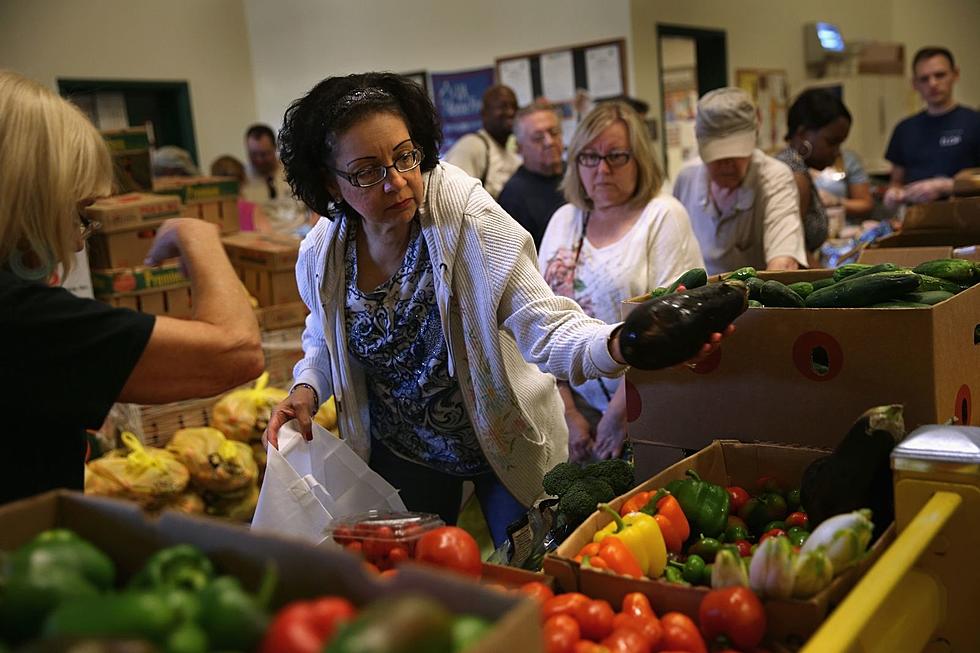
How Can New Jersey Adults Get Enough Fruits and Vegetables Daily?
Last week's Fitness Friday we talked about four tips for you to sustain a healthier you for the rest of your life and one of those tips was about what types of foods you should prioritize each week. Today, we are going to give you a better understanding about one of those food groups you need for the nutrients your body need for optimal function.
Fruits and Vegetables are essential part of a healthy lifestyle but for years we have been lied to by the Click-Bait articles, salacious social media posts and manipulative advertisements about how "hard" and "difficult" it is to eat enough of these important nutritional foods every day. New Jersey is the "Garden State" with some great produce farmed right here in our state like Tomatoes, Blueberries, Corn, and more.
Many people like to cite the USDA's recommendation on servings for different Macro Nutrients but they don't actually explain what those recommendations are or how you can accomplish getting enough Fruits and Vegetables each day. Today I want to cut through the BS and explain how YOU can do it!
The USDA recommends the serving size for Adults is to consume two to four cups of Fruits and Vegetables daily which they equate to "One Serving". According to the USDA 2010 report, adults between the ages of 19 and 64 need between 17 to 21 cups of fruits and vegetables each week. This averages out to 2.5 to 3 cups daily. That is actually very attainable if we think about how much we eat on a daily basis. But many people do not have the patience or time to measure out all these portions to make sure they are getting the exact amount of fruit and vegetables.
Now lets simplify all this information. As a NASM Certified Nutritional Specialist, I want to make sure you understand these recommendations are what we would call the base minimum of what people need to be healthy. Getting in just enough good food is not enough for optimal functionality of the human body. So lets review what you can eat every day to get in the proper amount of fruit and vegetables your body needs to be healthy and function properly. Here are some specific examples you can use:
Fruits
-1 Medium to Large banana equals one serving of fruit. Bananas are a great source of potassium and fiber as well as a solid source of vitamins C and A. Daily banana consumption will help regulate your digestive system while also helping muscular function. Most people do not get enough potassium in their diet so eating a banana a day will really help ensure you get a solid source of daily potassium and other beneficial vitamins.
-1 Medium to Large size Apple equals one serving of fruit. Apples a a good source of Vitamins A and C, while the skin of an apple being a great source of fiber. Also, the natural sugars in apples are fast digesting, which means the sugars are used as an energy source for the body or converted to glycogen for better brain function. So the old adage about eating "an apple a day will keep the doctor away" isn't far fetched at all!
-1 Medium to Large size Orange equals one serving of fruit. Oranges are one of the best sources of Vitamin C on earth, along with a good source of B vitamins. Also, like apples, the natural sugars in oranges are readily usable by the body and are fast digesting, so they do not get deposited as fat stores. There is no major nutritional difference between Oranges and their relatives Grapefruit and Tangerines. Tangerines have more sugars but less vitamin C value compared to Oranges. Grapefruit have similar levels of vitamin C but also have more Folate in them for energy production. One Grapefruit equals one serving of fruit, which 2 tangerines equal one serving of fruit.
Other fruit options include: Grapes (2 cups equals one serving) and Frozen Fruit (1 cup equals one serving for most fruit sold at your local supermarket).
Vegetables
-One Large size raw carrot or one cup of raw baby carrots equals one serving of vegetables. I want to specify raw carrots because any vegetable that is boiled in water looses between 33 to 50 percent of its nutritional value. Carrots are a great source of Vitamins A, B and K while also being a solid source of fiber. The antioxidants in Carrots (Carotenoids such as alpha-carotene, beta-carotene, and lutein) are important for your eyes functionality and health. Study from UCLA showed that people who regularly consume carrots can lower risks of developing glaucoma. Other long term studies have shown carrots to help reduce risk of developing Cardiovascular Disease and Colon Cancer.
-Four Spears or Two Halves of Pickles equals one serving of vegetables. Pickles are an excellent sources of Vitamin K, which is important for clotting skin injuries. Be careful what pickles you buy because some are made with high amounts of sodium that can sabotage some people's diets long term. Please consult your physician if you are on a blood thinner medicine if there are any potential side effects of eating "too many" pickles in one sitting.
-A medium to large size salad equals one to two servings of vegetables. Different salads have different nutritional benefits. A traditional Caesar salad only counts as one serving because there is only Romaine Lettuce while a traditional House salad that includes Iceberg Lettuce, Cucumbers, Tomatoes, Onions and/or Peppers, and Olives counts as 1.5 servings of vegetable (Medium size) or 2 servings of vegetables (Large size).
-Different types of lettuce of different nutritional values. Romaine Lettuce is very good source of Vitamins A & K along with high quality folate and fiber. Iceberg Lettuce is a great source of fiber and vitamin C. Red leaf Lettuce is very high in antioxidants along with Vitamin A and Lutein.
Other vegetable options include: Peppers (One whole Bell Pepper equals one serving) and Broccoli (one cup raw broccoli equals one serving; 1.5 to 3 cups of frozen broccoli equal one serving depending on if it is steamed or boiled in water).
Products derived from fruit
-All Orange Juices are not made the same. The higher the pulp amounts in the Orange Juice the higher value of nutrition is in the juice. Be wary of "No Pulp" oranges juices because the process of removing the pulp and other process the juice is processed through remove nutritional value from the juice while also adding unnecessary flavoring and non-organic sugars such as High Fructose Corn Syrup. The longer the ingredients list is on the back label that is not actual fruit, the more "junk" has been added to the juice, diluting the nutritional value and making that juice more of a sugar drink than anything else. These same guidelines can be applied to juices that claim to be derived from vegetables, always check the label to be sure if what is in the drink is actually what they claim on the front label.
-Similar to what I stated above about Orange Juice, Apple Sauces have the same dilemma. When you go to the local supermarket it is very difficult to find chunky apple sauce without a bunch of "junk" added into the product as "preservatives" to make it last longer. When looking at the ingredients label, if there is anything else added to the Apple Sauce aside from Apples, Water and Ascorbic Acid, then you know the nutritional value has been diluted. If you want to be fully sure of what you are buying is healthy, many local farmers markets from May through September have in stock organic chunky apple sauce OR you can buy a couple pounds of apples and make your own homemade apple sauce.
In conclusion, you do not need to buy any powders or spend hundreds of dollars on a juicing shake diet program to get the necessary amount of fruits and vegetables on a daily basis. The more fruits and vegetables you eat, the better your body will feel and function. Don't be fooled by TV and internet ads making claims that you now know are not true: You CAN get daily servings of fruits and vegetables on your own and for half the price of those products that commercials are pitching you on. So go get your Fruits and Vegetables New Jersey, most of them sold in our own state!
*Josh Hennig is more than just a Daily Host and Producer for 973 ESPN Atlantic City: Josh is a Certified Fitness Nutrition Specialist (FNS) from the National Academy of Sports Medicine (NASM) and studied The Psychology of Weight Control. Josh is a former NASM Certified Personal Trainer and studied Fitness Supplementation. Follow his personal IG for more Fitness and Life stuff: @joshuashennig
South Jersey Most Popular Jersey Fresh Produce
KEEP READING: South Jersey Athletes Who Played/Coached in NBA and MLB
More From Cat Country 107.3










